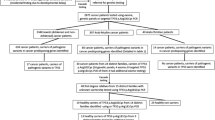Abstract
PURPOSE: We report the case of a boy aged 13 years who was diagnosed with a Dukes B obstructing cancer of the sigmoid colon. At the time of diagnosis, he underwent a Hartmann's procedure with end colostomy. Because of his unusually young age, he was referred to the Familial GI Cancer Registry at Mount Sinai Hospital for genetic assessment. A detailed pedigree revealed no significant history other than lung cancer in his maternal grandfather. METHODS: We obtained his tumor specimen and performed molecular analysis of both normal colonic and tumor DNA. Specifically, we identified replication errors (RER) in the patient's tumor DNA when compared with normal colonic DNA. RER has been found in more than 90 percent of tumors from patients with Hereditary Nonpolyposis Colon Cancer (HNPCC) and is, thus, considered to be one of the hallmarks of this disease. Because HNPCC patients have a 40 percent risk of synchronous or metachronous tumors, the recommended surgery for HNPCC should be at least a subtotal colectomy with ileorectal anastomosis. RESULTS: Based on molecular results, we were able to recommend that the patient have a subtotal colectomy performed instead of merely colostomy closure, to reduce his lifetime risk of developing further colon tumors and to make surveillance of the remaining rectum relatively easy. In this patient, we subsequently identified a germline mutation of the mismatch repair gene hMSH2 that is implicated in HNPCC. The possibility of HNPCC should be considered in adolescents who are diagnosed with colorectal cancer, so appropriate surgical decisions can be made.
Similar content being viewed by others
References
Ko YS, Lin LH, Chen DF. Carcinoma of the colon in a child. Acta Pediatr Sinica 1995;36:227–30.
Hwang EH, Chung WH. Adenocarcinoma of the transverse colon in a child with survival—case report. Yonsei Med J 1993;34:287–92.
Eccles DM, Bunyan DJ, Needell J, Thompson M. Colon cancer in a 16 year old girl [letter]. Lancet 1995;345:1643.
Steinberg JB, Tuggle DW, Postier RG. Adenocarcinoma of the colon in adolescents. Am J Surg 1988;156:460–2.
Goldthorn JF, Canizaro PC. Gastrointestinal malignancies in infancy, childhood and adolescence. Surg Clin North Am 1986;66:845–6l.
Lynch HT, Smyrk TC, Watson P,et al. Genetics, natural history, tumor spectrum, and pathology of hereditary nonpolyposis colorectal cancer: an updated review. Gastroenterology 1993;104:1535–49.
Vasen HF, Wijnen JT, Menko FH,et al. Cancer risk in families with hereditary nonpolyposis colorectal cancer diagnosed by mutation analysis. Gastroenterology 1996;110:1020–7.
Hamilton SR, Liu B, Parsons RE,et al. The molecular basis of Turcot's syndrome. N Engl J Med 1995;332:839–47.
Aiges HW, Khan E, Silverberg M. Adenocarcinoma of the colon in an adolescent with the family cancer syndrome. J Pediatr 1979;94:632–3.
Faragher IG, Cox CJ, Stevenson A. Hereditary non-polyposis colorectal cancer (Lynch syndrome II) in a 13 year old male. Aust N Z J Surg 1993;63:494–6.
Vasen HF, Mecklin J-P, Khan PM, Lynch HT. The International Collaborative Group on Hereditary Nonpolyposis Colorectal Cancer (ICG-HNPCC). Dis Colon Rectum 1991;34:424–5.
Fishel R, Lescoe MK, Rao MR,et al. The human mutator gene homolog MSH2 and its association with hereditary nonpolyposis colon cancer. Cell 1993;75:1027–30.
Leach FS, Nicolaides NC, Papadopoulos N,et al. Mutations of a mutS homolog in hereditary nonpolyposis colorectal cancer. Cell 1993;75:1215–25.
Bronner CE, Baker SM, Morrison PT,et al. Mutation in the DNA mismatch repair gene homologue hMLH1 is associated with hereditary non-polyposis colon cancer. Nature 1994;368:258–6l.
Papadopoulos N, Nicolaides NC, Wei YF,et al. Mutation of a mutL homolog in hereditary colon cancer. Science 1994;263:1625–9.
Nicolaides NC, Papadopoulaos N, Liu B,et al. Mutations of two PMS homologues in hereditary colon cancer. Nature 1994;371:75–80.
Chung DC, Rustgi AK. DNA mismatch repair and cancer. Gastroenterology 1995;109:1685–99.
Aaltonen LA, Peltomaki P, Mecklin JP,et al. Replication errors in benign and malignant tumors from hereditary nonpolyposis colorectal cancer patients. Cancer Res 1994;54:1645–8.
Peltomaki P, Lothe RA, Aaltonen LA,et al. Microsatellite instability is associated with tumors that characterize the hereditary non-polyposis colorectal carcinoma syndrome. Cancer Res 1993;53:5853–5.
Aaltonen LA, Peltomaki P, Leach FS,et al. Clues to the pathogenesis of familial colorectal cancer. Science 1993;260:812–6.
Schlotterer C, Tautz D. Slippage synthesis of simple sequence DNA. Nucleic Acids Res 1992;20:211–5.
Jass JR, Cottier DS, Jeevaratnam P,et al. Diagnostic use of microsatellite instability in hereditary non-polyposis colorectal cancer. Lancet 1995;346:1200-l.
Peltomaki PR. Microsatellite instability as an indicator of hereditary susceptibility to colon cancer. Gastroenterology 1995;190:2031–3.
Liu BS, Farrington M, Petersen GM,et al. Genetic instability occurs in the majority of young patients with colorectal cancer. Nat Med 1995;1:348–52.
Lynch P. Hereditary nonpolyposis colorectal carcinoma (HNPCC): clinical application of molecular diagnostic testing. Ann Med 1994;26:221–8.
Sankila R, Aaltonen LA, Jarvinen HJ, Mecklin J-P. Better survival in patients with MLH1-associated hereditary colon cancer. Gastroenterology 1996;110:682–7.
Watson P, Lynch HT. Extracolonic cancer in hereditary nonpolyposis colorectal cancer. Cancer 1993;71:677–85.
Madlensky L, Berk T, Bapat B,et al. A preventive registry for hereditary non-polyposis colorectal cancer (HNPCC). Can J Oncol 1995;5:355–60.
Author information
Authors and Affiliations
Additional information
Read at the annual meeting of The American Society of Colon and Rectal Surgeons, Seattle, Washington, June 9 to 14, 1996.
About this article
Cite this article
Madlensky, L., Bapat, B., Redston, M. et al. Using genetic information to make surgical decisions. Dis Colon Rectum 40, 240–243 (1997). https://doi.org/10.1007/BF02054995
Issue Date:
DOI: https://doi.org/10.1007/BF02054995




